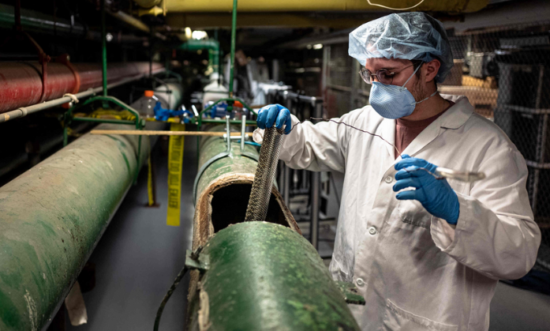Mom was right about veggies, searching through sewage, surprising dental-pain med, and more
19 Aug 2022
Posted by Andrew Kantor
Methadone on the sidelines
What if there was a drug that could help cut overdose deaths, and the only thing keeping it from being used was a bunch of legal hurdles? Perhaps, I dunno, cutting the regulations?
[A]mid a worsening addiction crisis, experts are urging the government to eliminate many of the restrictions surrounding methadone use. Keeping the current rules in place, they argue, probably costs thousands of lives each year.
Green veggie tales
Mom was right about green veggies when she said, “Honey, they can can help treat Crohn’s disease, ulcerative colitis, and other inflammatory bowel diseases! And no one in this house wants you to have an inflammatory bowel disease. Did I tell you about the time your Uncle Ray got stuck in the elevator?”
Actually, say Chinese and Los Angelino researchers, it’s the chlorophyllin they contain; it helps by alleviating inflammation and making sure your body is cleaning its insides properly (“modulate autophagy in the cells, which suppresses IBD symptoms”).
The best part: You can sell chlorophyllin as a supplement for those picky eaters.
The Tooth Fairy® takes note
Tooth extractions are fun and exciting, but they can also be painful. When that happens, despite the American Dental Association’s recommending high doses of OTC pain meds, “dentists frequently prescribe opioids for dental pain and contribute substantially to new and persistent opioid use.”
University of Rochester oral-health researchers found a potential middle ground: gabapentin. Yeah, the anti-convulsant.
The normal progression for pain treatment is higher and higher doses of acetaminophen or ibuprofen, eventually adding opioids to the mix. Instead, the U of R researchers gave gabapentin combinations to the patients with severe pain. And — based on how many came back asking for more — it seems gabapentin could be a solution. (“Additional studies […] are needed.”)
Even better, when they considered the data on dental patients who went on to abuse opioids, they found that …
“… eliminating opioid prescriptions may mean that approximately 105 individuals annually will not develop new and persistent opioid use associated with treatment at our clinic [alone].”
CDC plans overhaul
You might have noticed that the CDC hasn’t done the best possible job in its response to the Covid pandemic. Or the opioid crisis. Or the monkeypox problem. Or … you get the idea. Fear not! Director Rochelle Walensky announced the agency is launching “an overhaul of its structure and operations.”
The overhaul of the CDC’s approach to communicating with the public has already begun, and will include revamping and streamlining the agency’s web site and creating simplified public health guidance.
Good news: The problems span both the Trump and Biden administrations, so everyone gets to point a finger across the aisle while humming “America the Beautiful.”
Captain Obvious likes birds and bees, flowers and trees
“Gay men face hurdles to having biological kids”.
(The story, of course, is about the legal, regulatory, and logistical issues, but the headline still made us do a double-take.)
Why smokers want their morning coffee
It (may) work like this: After a night of nicotine withdrawal, smokers really, really crave it in the morning. But they often want coffee, too. Why? Because their nicotine receptors are in overdrive, and two compounds in coffee — choline and 1-methylpyridinium — help calm them down.
Essentially, University of Florida pharmacologists found, they “may help restore the nicotine receptor dysfunction that leads to nicotine cravings in smokers.”
How does viral surveillance work?
Are you sure you want to know? (Yes, you do. It’s more detailed and interesting than you think.)
The New York Times has a photo essay on how “a scrappy team of scientists, public health experts and plumbers is embracing wastewater surveillance as the future of disease tracking.”

Do you sell coloring books?
Perhaps you should. A Mayo Clinic article explains how coloring books — for adults, we mean — are good for mental health and relieving stress by letting you focus on the moment while ‘embracing the imperfect.’
It calms the brain and helps your body relax. This can improve sleep and fatigue while decreasing body aches, heart rate, respiration, and feelings of depression and anxiety.
Detecting bad science
“The best source of information to guide treatment is medical research. But how do you know when that information is reliable and evidence-based?“ asks a public-health researcher at the University of Colorado.
The answer: systemic reviews, which can help “catch potentially fraudulent studies and ensure they do not feed into recommendations.”
it’s possible for researchers who review and synthesize evidence to create a checklist of warning signs. […] We used these warning signs to create a screening tool — a set of questions to ask about how a study is done and reported — that provide clues about whether a study is real or not.
In completely unrelated news
“China now insists the pandemic didn’t start within its borders. Its scientists are publishing a flurry of papers pointing the finger elsewhere.”
The rest of the world is rolling its collective eyes. Money quote: “When you eliminate the absurd, it’s Wuhan.”
And while we’re here
“China Swabs Fish In Dubious Effort To Control Virus”
Testing fish for Covid is futile and a red herring—it is practically impossible for them to be infected, let alone pass that on to humans if they are.
The Long Read: Long Covid edition
Long Covid is a thing. But at this point, that’s about all the medical community can agree on. “How Long Will It Take to Understand Long Covid?” asks Smithsonian magazine.
[Al]though there is no longer debate that long Covid is a real phenomenon — both the Centers for Disease Control and Prevention and the World Health Organization have recognized its existence — the science is so new that many questions remain about how to define the condition, what causes it and how to effectively treat it.


